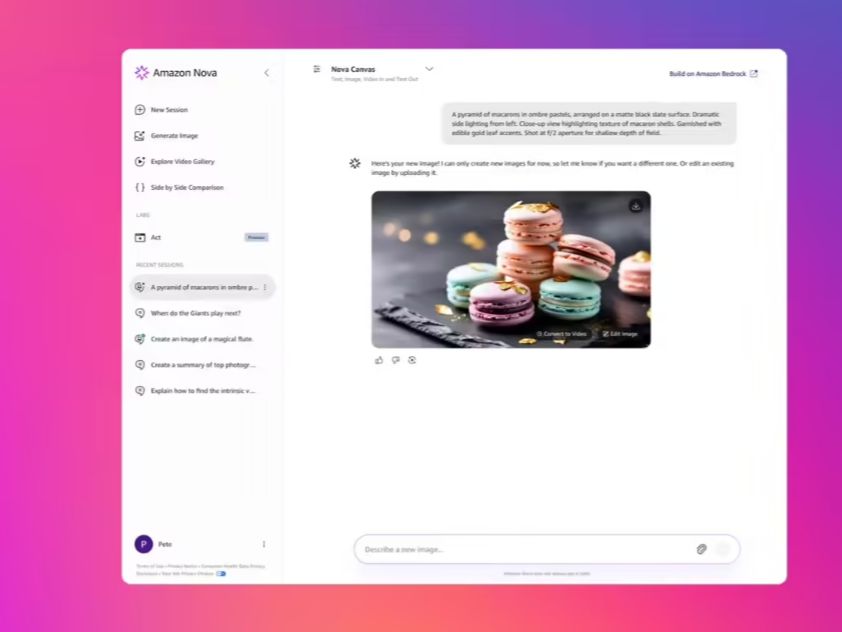April 1 News.Amazonofficially launched its general-purpose artificial intelligence on Monday local timeAgent(AI agent) --Nova Act. The smart body has the ability to manipulate a web browser and perform simple web tasks autonomously. At the same time, Amazon has also launched a companion Nova Act software development kit (SDK) designed to help developers prototype intelligent body applications using Nova Act.

According to 1AI, Nova Act was developed by Amazon's newly established AGI (General Artificial Intelligence) lab in San Francisco, and the technology will also provide key functionality for Alexa +, the highly anticipated generative AI-enhanced voice assistant. However, Amazon said that today's open version is a "research preview", the function is still to be improved.
Developers can access the Nova Act Toolkit through a new dedicated website, nova.amazon.com, which also serves as Amazon's showcase for its various Nova base models.
The launch of Nova Act marks Amazon's formal entry into the AI body technology race, with the intention of using its own general-purpose AI body technology to compete with products such as OpenAI's Operator and Anthropic's Computer Use. It is widely recognized by leading tech companies that AI intelligences that can browse the web and perform tasks on behalf of users will greatly enhance the utility of existing AI chatbots. While Amazon is not the first company to develop such technology, Nova Act may have the broadest potential for future adoption thanks to its large Alexa user base.
Amazon describes thatUsing the Nova Act SDK, developers will be able to automate a number of basic network operations for their usersThe toolkit provides a range of tools to enable AI intelligences to navigate web pages, fill out forms, and more, such as ordering a salad from the restaurant brand Sweetgreen or making a dinner reservation online. The toolkit provides a range of tools to enable AI intelligences to navigate web pages, fill out forms, select dates on a calendar, and more.
In terms of performance, Amazon claims thatNova Act outperforms similar intelligences from OpenAI and Anthropic in several internal testsThe Nova Act scored 94% on the ScreenSpot Web Text test, which measures the ability of AI intelligences to interact with screen text. In the ScreenSpot Web Text test, for example, which measures the ability of AI intelligences to interact with on-screen text, Nova Act scored a whopping 941 TP3T, outperforming OpenAI's CUA (881 TP3T) and Anthropic's Claude 3.7 Sonnet (901 TP3T). It's worth noting, however, that Amazon has not published Nova Act's test results on the industry's more commonly used benchmarks for evaluating intelligences, such as WebVoyager.
Nova Act is the first public product to be released to the public from Amazon's aforementioned AGI Lab. The lab is co-led by former OpenAI researchers David Luan and Pieter Abbeel. The two experts founded AI startups Adept and Covariant, respectively, before being hired by Amazon last year to lead its AI intelligence development efforts.
In an interview with TechCrunch, Luan explained why a lab aiming for AGI would develop AI intelligences that order salads, saying that he sees intelligences as a key step in building super-intelligent AI systems. He defines AGI as "an AI system that can help you do anything a human can do on a computer." Luan also said that his team designed the Nova Act SDK to reliably automate short, simple tasks and provide developers with the tools to define exactly when a human needs to intervene in the intelligence's workflow. Luan also said that his team designed the Nova Act SDK to reliably automate short, simple tasks and give developers the tools to define exactly when a human needs to intervene in an intelligence's workflow. With this, he hopes to help developers create more reliable intelligent body applications, even if they don't necessarily run fully autonomously.
Currently, early-stage AI intelligences from companies like OpenAI, Google, and Anthropic generally face significant challenges of lack of reliability when applied across different domains. According to tests by TechCrunch and others, these systems tend to run slowly, struggle to work independently for long periods of time, and are prone to making mistakes that humans don't usually make. It remains to be seen whether Amazon has found an effective way to overcome these challenges, or whether its Nova Act intelligences will suffer from the same shortcomings.